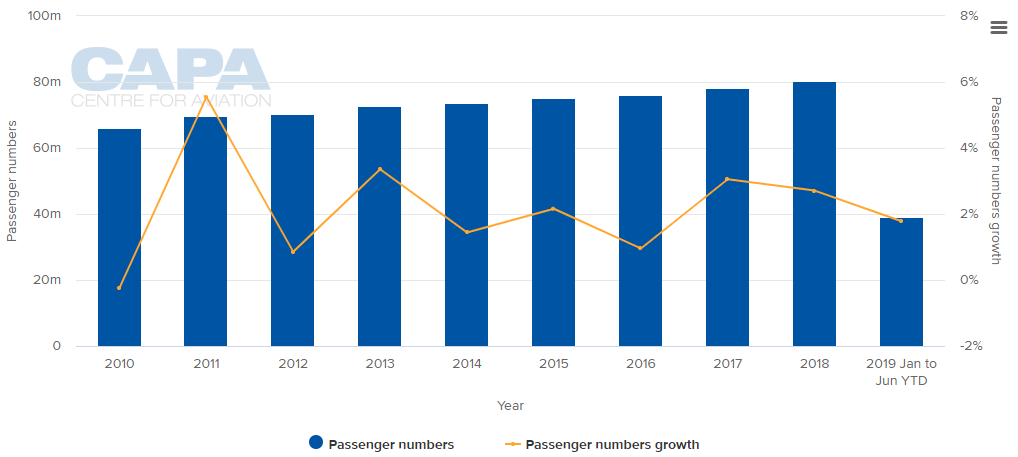The first phase of the HS2 line between London and Birmingham is due to open at the end of 2026, with the second phase extending to Leeds and Manchester scheduled for completion by 2032-33, but the minister has confirmed that despite billions already having been invested in the project, it could still ultimately be scrapped.
He says that upon completion of the review, a "go or no-go" decision will be made by the end of the year, which could scrap the project altogether or adjust timescales and the phases of development.
Last month (Jul-2019), the current chairman of the project, Allan Cook, reportedly warned that the total cost could exceed the current budget of GBP56 billion by as much as GBP30 billion. In a debate, former Commons leader Andrea Leadsom recently claimed the bill for the high-speed rail line could ultimately top GBP100 billion.
Upon launching the independent review, Mr Shapps says it is "responsible" to see whether the benefits really "stack up". The review will be chaired by Douglas Oakervee, a civil engineer and former chair of executive non-departmental public body HS2 Ltd with Labour peer Lord Berkeley, another civil engineer who worked on the construction of the Channel Tunnel, acting as his deputy.
[perfectpullquote align="full" bordertop="false" cite="" link="" color="" class="" size=""]"The prime minister has been clear that transport infrastructure has the potential to drive economic growth, redistribute opportunity and support towns and cities across the UK, but that investments must be subject to continuous assessment of their costs and benefits. That's why we are undertaking this independent and rigorous review of HS2."
Grant Shapps, UK Transport Secretary[/perfectpullquote]
The initial plan is for the new railway line is to deliver large capacity trains seating up to 1,100 passengers, operating up to 14 times per hour in each direction and travelling at speeds of up to 250mph. The Department for Transport says this would triple the capacity of trains across the entire route which currently suffers from severe overcrowding and poor reliability due to ageing infrastructure.
In his statement Mr Shapps said: "The prime minister has been clear that transport infrastructure has the potential to drive economic growth, redistribute opportunity and support towns and cities across the UK, but that investments must be subject to continuous assessment of their costs and benefits. That's why we are undertaking this independent and rigorous review of HS2."
HS2 has always been controversial. Intended to help redress the balance between the economies of the north and south of the country some people believe it would do the opposite and turn Midlands and northern cities into commuter suburbs for London. Others worry about its impact on long-established small communities in its path and on areas of natural beauty.
A number of aviation industry figures have made reference to how rail travel should be a realistic alternative to air travel over short distances. The most recent was Dubai Airports' CEO Paul Griffiths, speaking at the CAPA - Centre for Aviation Airline CEOs in Seoul Summit, who said short haul transport could change as new technologies are introduced.
The UK has ultimately lagged behind others in the take-up of high-speed rail services. The fastest trains currently travel at 125mph with the exception of HS1, between London and the Channel Tunnel, which reaches speeds of 185mph, since 2003.
While there are no air services between London and Birmingham anyway, HS2 has the potential to remove the need for such services connecting the capital to Manchester (where there would be a station at the airport, as with Birmingham), Leeds, and if it were to be further extended, Newcastle, Glasgow and Edinburgh. With speeds of around 225 mph the journey time to Manchester would be just over one hour and to Leeds just less than 1.5 hours. City centre to city centre that is considerably faster than by air.
CHART - London Heathrow airport has seen very stable growth this decade influenced by its significant capacity constraints Source: CAPA - Centre for Aviation and London Heathrow airport reports
Source: CAPA - Centre for Aviation and London Heathrow airport reports
While the urgent matter of Brexit remains the UK's priority, there has been increasing rhetoric from the government since Mr Johnson's appointment on another major investment into transport infrastructure, notably Heathrow's new runway. The Blue Swan Daily has reported regularly on this and the question of whether it will ultimately ever be built even though it has already been selected as the preferred location for an additional runway to support the London market.
With his South Uxbridge and Ruislip constituency close to Heathrow, Mr Johnson had fiercely stood against the new runway at Heathrow. He even vowed to lie down "in front of those bulldozers" to stop its construction, but controversially missed the government vote on the matter after travelling abroad in his then role as foreign secretary.
Mr Shapps has recently raised concerns over the project with a view he says that is shared with the prime minister. "My view and the prime minister's view is the same actually…There are questions about whether the whole plan stacks up," he said.
Latest performance metrics from London Heathrow suggest that the UK's largest hub and still one of the world's largest international airports, will see growth again this year despite its long-standing capacity constraints and will handle more than 81 million annual passengers.
Interestingly, the availability of domestic connections is one of the big factors for the construction of the new runway at the UK's air transport hub, important capacity that will be required if HS2 is not delivered completely or even if its scale is reduced to limit costs.